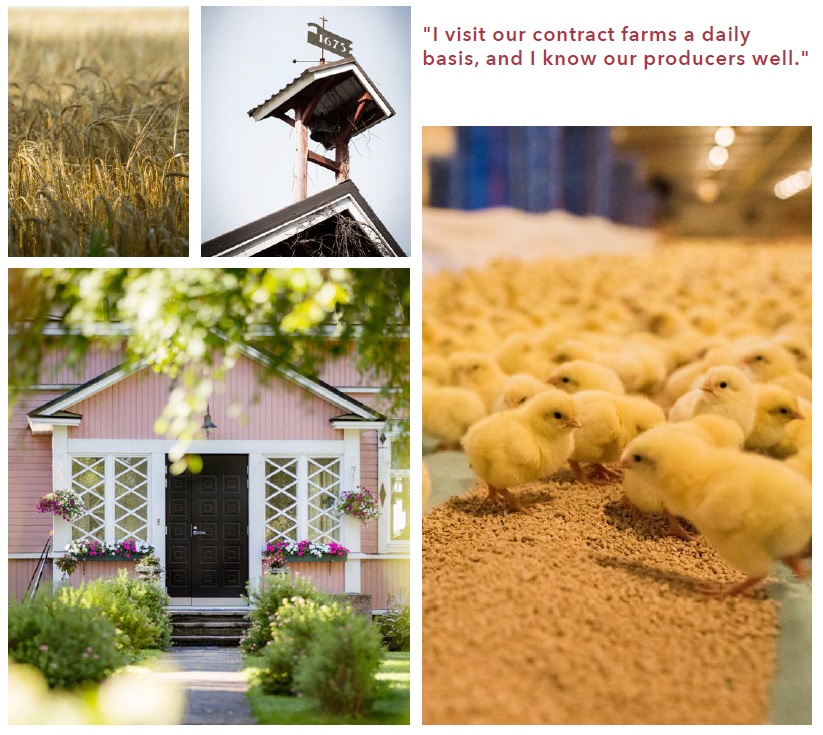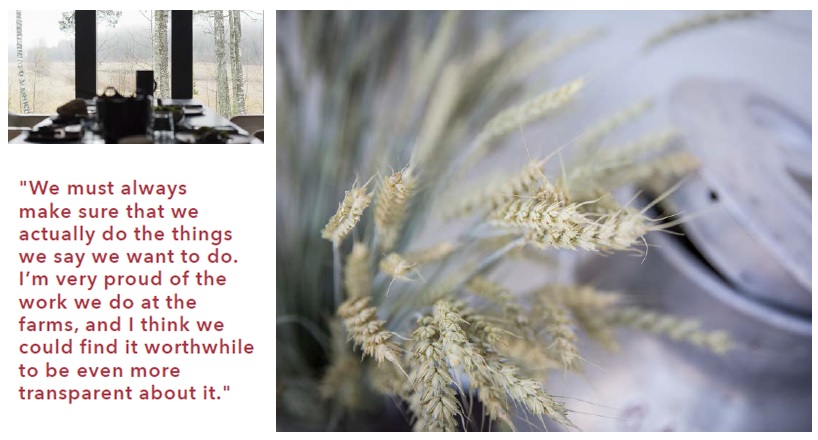In this article series we highlight the people that bring our From Farm to Fork strategy to life. Meet veterinarian Leena Pohjola.
Daily work to maintain hygiene and proper protection from diseases is crucial for food safety, says veterinarian Leena Pohjola from HKScan.
A specialist in poultry, with a doctoral thesis on the subject, Leena Pohjola has always been interested in working with farm animals. She believes that HKScan having an in-house vet is highly significant in the successful coordination and transparency of operations.
“I visit our contract farms on almost a daily basis, and I know our producers well. I feel responsible for ensuring that their farms follow HKScan’s practices and agree with our values”, she says.
In practice, Pohjola engages in preventive animal health care. She works together with the veterinarians who inspect meat quality, as well as the Regional State Administrative Agencies and municipal veterinarians who oversee the farms. Other members of the primary production team are her closest colleagues.
“I get great help from our production and feed experts, and really wouldn’t be able to succeed without them. Vets often work alone, but I enjoy being able to tackle problems together with other specialists in this great team.”

Nordic Traditions
According to Pohjola, Nordic poultry vets cooperate closely with each other. The neighbouring countries have similar breeding methods, and they share challenges and best practices. “For example, the Nordic countries have good animal health and a low need for medication. This is the result of decades of collaborative work. Credit for this goes to the farmers, who have done excellent work with the aim of completely eradicating diseases that affect food safety, such as salmonella or avian diseases that require antibiotics. Unfortunately, we often think this is a given, although you only need to go to Central Europe to see a very different situation”, Pohjola says.
Pohjola believes that in the future, diseases similar to avian influenza will be increasingly common among wild birds. The risks are highest when migratory birds arrive in the north to nest. Climate change may also result in milder temperatures, and less of the frost that helps to slow down the spread of diseases.
“Therefore, it’s very important to keep a close eye on protection against disease and the hygiene chain. We need to further develop these all the way from feed supply and hatcheries to keep pathogens away from the farms.”

Attention to Animal Welfare
In addition to good health and protection from disease, HKScan has also been focusing its development efforts on improving animal wellbeing by giving them the opportunity to behave in ways that are natural for their species. A good example of this is the unique “Farmborn” method piloted by HKScan, which lets the chicks hatch at their home farms instead of in a separate hatchery. The idea is to give the chicks a strong and stress-free start to life.
“I think we already have a good basic level of animal welfare in our production, but of course we are striving to continuously improve it further. For example, henhouses today have many things to stimulate the chickens, such as roosts to sit on and litter to bathe in and scratch”, Pohjola says.
Pohjola places great importance on the close cooperation with producers as one of the focus areas of nk that the emphasis on farms also proves that we value producers’ work highly. Mistakes made in primary production are difficult to fix later in the chain. We must always make sure that we actually do the things we say we want to do. I’m very proud of the work we do at the farms, and I think we could find it worthwhile to be even more transparent about it”, she concludes.
Read more in related articles in our Story Kitchen: It is totally okay to be a chicken and stay indoors
More expert stories in our Annual Report





